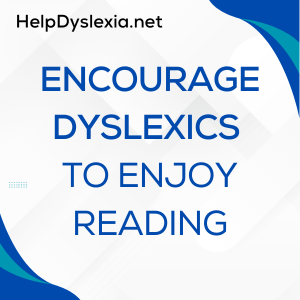If you have dyslexic children, finding ways to help them enjoy reading can be a struggle. After all, it’s hard to turn an activity that’s already difficult into something fun. However, there are some things you can do to encourage your kids to read more and get more enjoyment out of it at the same time. Here are seven tips on how to encourage dyslexics children to enjoy reading more with their dyslexia not holding them back!
Buy Books They’ll Love
If you have a dyslexic child, one of your top concerns might be how to help him develop a love for reading. Consider buying books that will hook him on reading—something like Diary of a Wimpy Kid or Harry Potter. Also consider making an investment in an e-reader, which can make it easier for kids with dyslexia and other conditions (such as ADHD) to focus their attention. Studies have shown that using e-readers can reduce problems associated with some learning disabilities. They also decrease eye fatigue and allow dyslexic kids and others to customize what they read and how it’s presented on screen.
Take Them to the Library
Kids with dyslexia often read slowly and have trouble understanding what they’re reading. The next time you read with your child, make it a point to talk about what’s happening in the story. Ask questions about it: How does that character feel? What will happen next? Does that character remind you of someone in real life? Allow your child to stop and think before answering, if necessary. Discussing what happens in a book shows kids how reading can help them gain more knowledge about their world. And knowing how people feel or what might happen next can also encourage reluctant readers because they’ll understand why picking up a book is worth their time and effort.
Read with them
Reading out loud to your child is a fun and easy way to make them feel good about reading. Even if they can’t understand what they’re reading, you can help them sound out words, which builds confidence. And there are also benefits for you. Research shows that parents who read with their children have kids who grow up smarter and more likely to do well in school. Even 5 minutes a day makes a difference in children under 3 years old. Reading together not only gives both of you quality time but helps them learn at an early age how much fun reading can be!
Ask Questions
If you have a child with dyslexia, you probably already know that reading out loud helps kids learn how to read. In addition, audiobooks are an excellent way for your dyslexic child to enjoy books in his or her own time and at his or her own pace. For example, say your son is struggling with a new book: As soon as he’s ready for help (or if he just needs motivation), get him an audiobook version of that book. Now, whenever he’s feeling stuck—or just needs more time—he can get up and listen to it on headphones.
Use Audiobooks
This method doesn’t work for every child, but if your child has a hard time reading text on a page, it may be worth trying audiobooks. Some children prefer listening over reading because they’re able to process auditory information better than visual information. Audiobooks can often keep their attention longer than regular books and some children find comfort in hearing someone else read so they don’t have to. If you decide to try audiobooks with your dyslexic child, start with shorter stories first and increase from there. Most audio services offer samples of their content so you can get a feel for what you like and what will work best for your child before purchasing anything.
Buy them magazines they´ll love
It’s been shown that a child who connects with a magazine will read it cover-to-cover. While it might be tempting to buy your kids pop culture magazines or newspapers, they’re not going to connect with articles on Katy Perry and Donald Trump, so instead try picking up publications that relate more closely to their interests. For example, if your child loves animals, pick up a National Geographic Kids magazine. If your son or daughter is obsessed with Star Wars, there’s no reason you can’t pick up an issue of Star Wars: The Clone Wars. With these publications—and many others—they’ll be able to connect with something on each page of every issue they read.


